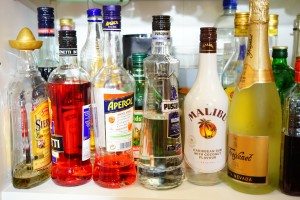Binge drinking by young people can have a dangerous effect on their mental health, bringing on mood disorders and slowing their brain’s development, experts say.
For youth who already suffer from a mental illness, their symptoms can be exacerbated.
Dr Daniel Hermens from the University of Sydney’s Brain and Mind Research Institute (BMRI) said between the ages of 16 and 25 brains are undergoing a lot of change and alcohol can impair that growth.
Young people with mental health problems who get drunk several times a week are at risk of structural and neurochemical changes to the parts of the brain responsible for long-term memory and decision making.
“If you’re a young person with depression, a history of depression, or even a family history of depression, then you may be at an even greater risk of brain changes, changes in your concentration and your memory if you misuse alcohol,” Dr Hermens said.
Young brain ‘best equipped to recover’
The BMRI wants to develop a cognitive screening test for hospitals and GPs to detect the subtle neurological impacts of alcohol misuse in young people’s brains.
“The really good news about all this though is that the young brain is best equipped to recover,” Dr Hermens said.
Psychiatrist Dr Elizabeth Scott from Headspace (the national youth mental health foundation) says without early intervention, young people are in danger of developing more persistent and chronic problems that have a major impact on their adult life.
“Young people with mental health problems are two to three times more likely to use drugs and alcohol compared to their peers of the same age in the general community,” she said.
“The mix of mental health problems and drugs and alcohol problems can lead to vicious cycles of illness and disability.”
Turning a life around
Rachael Laidler, now 22, has been sober for almost a year, but used to go out drinking most nights of the week with her friends.
“When I was trying to have an easy night [and] not drink too much, I’d have four scotch and cokes maybe a little bit more, but on really big nights on a weekend at friends’ parties I’d have a whole bottle of scotch,” she said.
Rachael had been diagnosed with bipolar disorder when she was 16 years old, then by 19 had replaced her medication with alcohol.
“I was very, very unhappy,” she said.
“I didn’t feel like I had much of a good future to look forward to so it was very bleak, but overall I didn’t notice it so much because I was inebriated so much of the time.”
Rachael did not believe she had a drinking problem because she thought alcoholics drank alone at home, which she was not doing.
“I didn’t realise I was drinking heavily, it was such a shock for me to hear ‘you’re drinking too much’, I genuinely had no idea at the time,” she said.
Dr Scott suggested Rachael go to U Space, a specialist inpatient service for young adults with mental health issues based at Sydney’s St Vincent’s Private Hospital.
Once Rachael stopped drinking it was safe for her to resume taking her medication.
“It’s very important to intervene early,” Dr Scott said.
“You can see from Rachael’s story that [binge drinking] could have gone on for a long time.
“The longer that had gone on the more damage that could have done to her brain.”
Now, Rachael is studying business administration, and volunteering with several organisations.
“It’s amazing to think I can do whatever I want now, I have a future and I have something to work towards,” she said.
“I’m really proud of everything I’ve achieved. I’m really proud of everything that I’m going to achieve.”
With Mental Health Week beginning on Sunday, Rachael is urging all young people, especially those with a mental illness, to think twice before binge drinking.
“I’m not saying it’s wrong to have a drink and spend time with your friends, but do it safely and be smart about it,” she said.
This article first appeared on ‘ABC’ on 6 October 2014.























